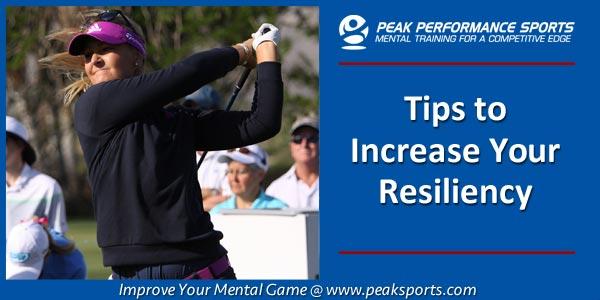Do Negative Emotions Destroy Your Golf Game?
Are you a resilient golfer and able to keep your emotions in check after a bad shot?
Or do negative emotions destroy your golf game?
Can you recall the last time you missed a shot and landed in the rough… Were you able to focus and get back on track?
You may have experienced intense negative emotions which threw you off your game…
Maybe you started to focus on what you didn’t want (“I hope I don’t mess up my next shot”) rather than what you do want (“I am going to hit this shot straight down the fairway”).
A negative focus tends to heighten counter-productive emotions and prolong poor performance.
Resilient golfers are able to focus on the next shot, not the last shot.
Resilient golfers can manage their emotions so that they remain in control on their performance.
While talent is important in a golfer, it isn’t enough. To play at your peak, you need to develop the mental skill of resiliency.
What is a “resilient golfer”?
The definition of resiliency is the capacity to recover quickly from difficulties.
Resiliency is the hallmark of mental toughness.
A resilient golfer is one who can recover quickly after a poor shot or hole.
Resilient golfers can make adjustments on the fly despite poor course or weather conditions.
Resilient golfers learn from their mistakes and turn setbacks into progress.
Resilient golfers stay confident after a bad tournament.
How is “resiliency developed”?
Well, resiliency is not a genetic characteristic. That is great news!
If there is no resiliency gene then resilience can be developed through some conscious awareness and focused work.
If you can learn to harness your emotions, your composure will be stronger in difficult situations and you will play better golf.
But there is a huge myth regarding resiliency. Many athletes view resiliency as a reaction or something that happens after the fact.
Resiliency is a mental tool that you have in place before you experience a performance roadblock.
Resiliency is like preventative medicine that helps you control your emotions prior to stressful situations.
Resiliency allows you to keep an even keel and in your optimal emotional performance zone.
Resiliency is developed through practice.
By creating pressure situations in practice and remaining calm, you teach your brain to stay poised in critical moments.
But remember, improving your mental game requires focus and repetition.
Your game will improve dramatically if you commit to developing resiliency.
Try these tips to increase your resiliency:
- Tip #1: You should put yourself in stressful situations in practice. Slice a shot, get in control of your emotions (deep breathing), then choose an effective line of thinking (What do you want to do now?).
- Tip #2: Always remind yourself that true confidence does not take a hit after a bad shot, hole, round. True confidence is enduring and stable. Ask yourself: how many years have I worked on my confidence in golf?
Successful golfers have learned how to perform with ultimate confidence in competition. We’ve developed The Golfer’s Mental Edge Workbook Program to help you do this.
Related Sports Psychology Articles
- Do You Beat Yourself Up and Lose Confidence After Defeat?
- How to be Resilient on the Court
- How to Perform Big in Pressure Moments
*Subscribe to The Sports Psychology Podcast on iTunes
*Subscribe to The Sports Psychology Podcast on Spotify
Download a free sports psychology report to improve your mental game!
Learn more about our one-on-one mental game coaching.
Golfer’s Mental Edge

What’s the big sign that your mental game is the weak link in your golf game? When you can’t play consistently as well as when you play a practice or casual round–or your range game is way better than your game on the course. If you suffer from lack of focus, low self-confidence, poor composure or other mental game obstacles on the course, you can’t reach your true potential in golf.
The Golfer’s Mental Edge 2.0 Audio and Workbook program is ideal for any amateur, collegiate, junior, and tour professional golfer.
Golf coaches and instructors would also be wise to teach “The Golfer’s Mental Edge 2.0” principles to their players. This program is perfect for any golfer who wants to improve performance and consistency by managing their mind better on the course.



Great advice listed here. Resiliency is what separates a champion from an amateur. The tips listed above should give you a competitive advantage during a round. Thanks for sharing with us!